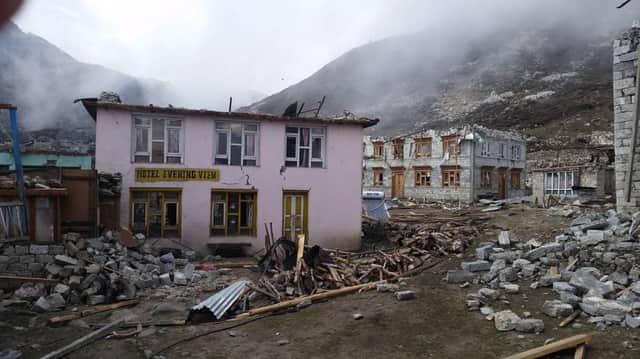Alistair Dutton: Return to Nepal a year after it was hit by quake


As I drove from the airport when I arrived Kathmandu I saw many signs of the damage that was caused by the devastating earthquake a year ago, and of the progress that has been made since. Nepal is close to my heart, as my first job in international development was with refugees from Bhutan in the east of the country in 1996. When I first heard news of the earthquake I was dismayed to imagine the impact on this beautiful country, rich in culture and history, and the terrible human tragedy.
The 7.8-magnitude earthquake killed nearly 9,000 people and left a million survivors in need of immediate help. Even before the earthquake, Nepal was one of the poorest countries in the world, with over 75 per cent of its people dependent on farming, livestock and casual labour to earn a living. According to the World Bank the earthquake and aftershocks pushed an additional 700,000 people into poverty. The Nepali government estimated that the disaster led to the financial loss of over $7 billion (£4.bn).
Advertisement
Hide AdAdvertisement
Hide AdAs soon as the earthquake happened Caritas Nepal was out in the streets with the people, and very quickly was able to give them tarpaulins, blankets and jerry cans so that they could cope for the next few nights. With the help of SCIAF supporters and the Catholic Church worldwide, Caritas agencies were able to get relief to more than 350,000 people in the first four months. Thanks to supporters’ generosity, SCIAF contributed £200,000 to Caritas’ immediate response.
Many of the survivors were cut off in remote mountainous areas and the destruction of roads, public buildings, communications networks and other vital infrastructure added to the immediate chaos and difficulty of reaching those affected. Co-ordination between Caritas Nepal and many other organisations ensured that as many lives as possible were saved in the immediate aftermath.
In most natural disasters the poorest people are usually the most vulnerable and experience the greatest hardship. Lack of savings or other assets in poorer families mean they aren’t able to buy food, travel to safer areas or rebuild their homes when disaster strikes and their normal income stops. In Nepal the damage was greatest in poorer rural areas where many homes were made from mud and bricks and not able to withstand the force of the earthquake and aftershocks. A priority for Caritas Nepal was getting aid to those most in need, especially in rural areas.
Fr Silas Bogati, the executive director of Caritas Nepal, reflected: “The unity of the Caritas network meant we were able to react quickly to the emergency and it has helped us to achieve so many things over the past year. Now we’re shaping a future alongside our Nepali brothers and sisters. We will build earthquake-resistant houses so people feel safe, we’re making sure children can go to school and that families have water, and we’re supporting people to sow their fields and reap their harvests”
Once people began to have what they needed to live day to day, attention quickly turned to longer-term reconstruction of people’s homes, communities and livelihoods. In total, thanks to Scottish generosity, SCIAF raised over £659,000, the remaining £459,000 of which is providing families with houses, water, sanitation and help to earn a living. Construction on this scale – and this is just Caritas’ part of the overall response – takes time to plan and organise. Caritas Nepal has now launched a three-year, £18M programme to accomplish this. For now peoples’ lives are relatively stable and they’re getting back on their feet. Gradually they’re coming to terms with their devastating losses but it will still be some time before things can really get back to normal. A major part of the programme will be constructing earthquake resistant houses for over 4,600 families. People will gain the skills and the materials to ‘build back better’, so that if (and in all likelihood when) disaster strikes again they will be better prepared.
Many people lost their businesses or were left unemployed after the earthquake. To help them the programme will employ about 2,000 of the poorest families to rebuild infrastructure, repair damaged roads, drains and irrigation channels, and clear remaining debris. Another 2,600 families will start farming again, with seeds, tools and livestock being given to those who need them most.
The situation for many people in Nepal remains very difficult, but people who have faced unbelievable destruction and the loss of loved ones, are courageously rebuilding their lives. Time and time again I am humbled by the courage, hope and strength of people in the worst of situations. I am proud that the support of the Scottish people saved lives 12 months ago, and continues to help people and give them hope through the long process of rebuilding.
• Alistair Dutton is the Director of the Scottish Catholic International Aid Fund (SCIAF).